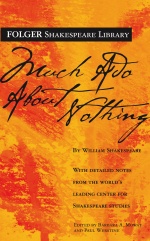Much Ado About Nothing
This article is about Shakespeare's play. For other uses, see Much Ado About Nothing (disambiguation).
Much Ado About Nothing, one of William Shakespeare's plays, includes two quite different stories of romantic love. Hero and Claudio fall in love almost at first sight, but an outsider, Don John, strikes out at their happiness. Beatrice and Benedick are kept apart by pride and mutual antagonism until others decide to play Cupid.
Over the centuries, the Beatrice-Benedick plot has most captivated audiences and readers. It is, however, the conjunction of Beatrice and Benedick with Hero and Claudio that makes Much Ado so rewarding. As Beatrice and Benedick learn to “suffer love” together, Claudio and Hero become acquainted first with life’s darkness and then with unexpected joy. While the play calls itself "Much Ado about Nothing,” its stories are actually about life at its most important.
Much Ado About Nothing was printed as a quarto in 1600, and was probably written in 1598–99. Shakespeare relied upon many sources, including Ariosto's Orlando Furioso and Edmund Spenser's The Faerie Queene.[1]
Productions at the Folger
- Much Ado About Nothing (Folger Theatre, 2009)
- Much Ado About Nothing (Folger Theatre, 2005)
- Much Ado About Nothing (Folger Theatre, 1998)
- Helen Hayes Awards
- Wins: "Outstanding Set Design" for Tony Cisek
- Nominations: "Outstanding Lead Actress, Resident Play" for Holly Twyford, and "Outstanding Residential Play"
Early editions
First Folio
- LUNA: First Folio: I3r - L1r
- Hamnet: STC 22273 Fo. 1 no. 68
Second Folio
- LUNA: Second Folio: I3r - L1r
- Hamnet: STC 22274 Fo. 2 no. 07
First Quarto
- LUNA: First Quarto
- Hamnet: STC 222304
Modern editions
Much Ado About Nothing can be read online with Folger Digital Texts and purchased from Simon and Schuster.
- Hamnet link to Folger Edition: PR2753 .M6 copy 2 v.26
In popular culture
Translations
Performance materials
Other media
Notes
<references>
- ↑ Adapted from the Folger Library Shakespeare edition, edited by Barbara A. Mowat and Paul Werstine. © 1995 Folger Shakespeare Library.
